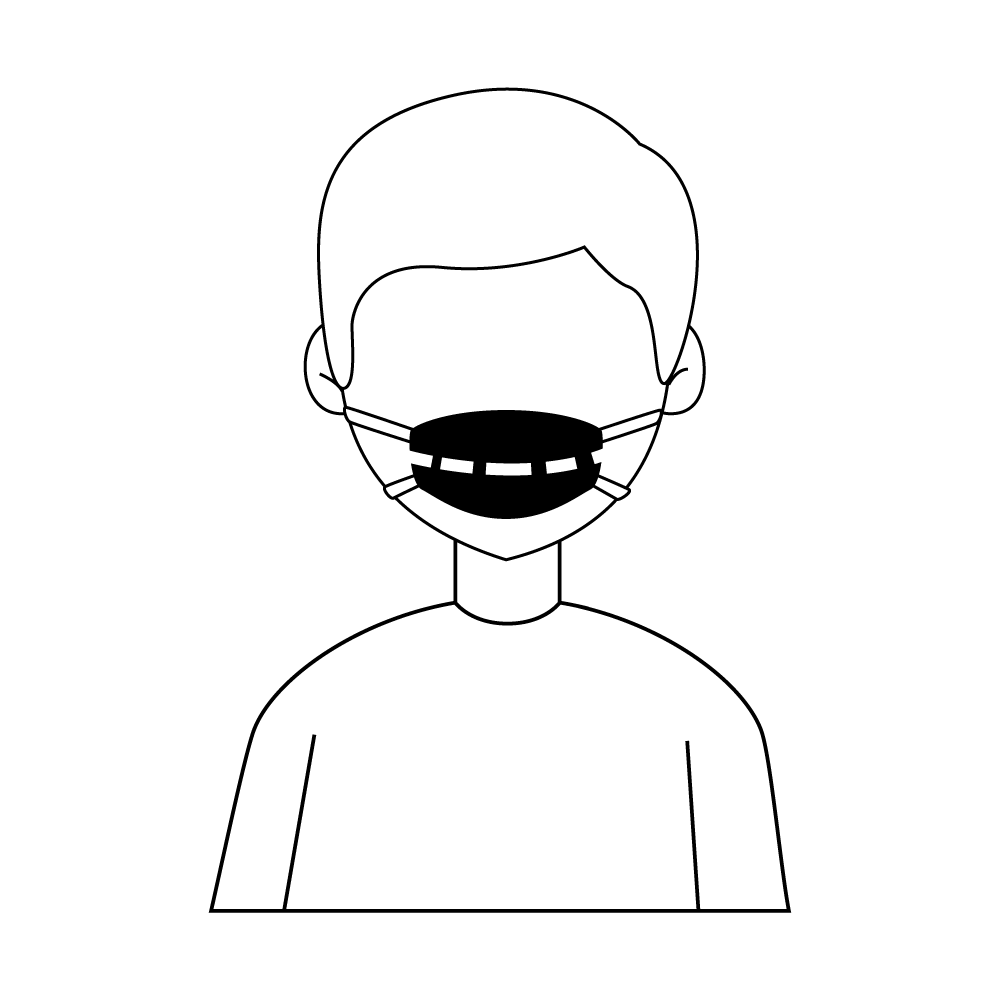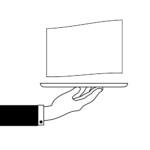A CONCRETE CITY
If everyone was open to change by preserving public spaces and by being more careful then maybe Pristina could be in a better state. Streets would be passable and accessible for cars and pedestrians, and the city would look entirely more pleasing. Maybe there would also be big parks and many people having fun in them but also taking care of the nature.
Illustration: Argjira Kukaj

A multimillion mix of stones, gravel and concrete is suffocating us, and a walk through the city of Pristina will confirm this. Pristina is the home of thousands of careless people who don’t understand that public property is for everyone and should be preserved same as private property, but the city problems aren’t entirely the residents’ fault but also the leaderships’.
While climbing down the rebuilt stairs of the neighborhood Arberia to start the walk through the city there are hundreds of small pine trees planted on straight lines that are withering one by one. The same fate goes to many flowers along the streets and city squares that besides not being watered, they are also stepped on from careless citizens’ feet.
After walking through those tiring stairs you find yourself near the center, where some traffic lights that have been non-functional for years can also be noticed. After that when approaching the NEWBORN monument some trash containers placed in the last few months can be seen. Even though there is room in the secondary street where they can be placed, the Municipality of Pristina has placed them in one of the most frequented streets of the city, where they not only release a strong smell, they also leak a black mass often times sticky in the concrete around it.
On the other side of the street the memorial “Heroines” is left behind. In a park which is built for honoring women survivors of the last war in Kosovo, there shouldn’t be offensive scribbling and drawings. From there I continue my path to the campus of the University of Prishtina which with its green space, even though it gives a bit of grace/charm/pleasantness and oxygen to the city center, it risks becoming an underground parking space.
Then I return the focus to collective buildings, and many of them are quite old and have never been renovated. Most of their entrances are even more worrying and scary, by lacking lights, while you can find trash all around.
My feet lead me to another frequented street of the capital city filled not only with dust and concrete, but also garbage. And the many cars that have occupied the sidewalk make it nearly impossible moving further. Besides that, there are also a lot of traffic signs missing, which either haven’t ever been placed or have been stolen and vandalized. It’s so hard for me to move now that it’s summer, while I imagine how hard this moving around will be during winter when streets will glisten from the smooth and dangerous surface, because the snow and ice “will catch us by surprise” this year also. For a moment I stop and take a deep breath, and think that this air I’m breathing in summer will turn to “poison” in winter.
If everyone was open to change by preserving public spaces and by being more careful then maybe Pristina could be in a better state. Streets would be passable and accessible for cars and pedestrians, and the city would look entirely more pleasing. Maybe there would also be big parks and many people having fun in them but also taking care of the nature. If each one of us had more caution for the space we live in, starting from the moment we get out of home, then for the neighborhood and the whole city, I believe the state would be different. A contribution from all of us is enough for changes to occur. In this way we would be more prepared and competent to raise our voice to higher governing bodies for them to invest in the city. A united community for a united city would be a very good motto to start change.
A clean Pristina, proper, beautiful and with careful and loving people is not a hard thing to achieve, all that is needed is a bit of work and a lot of open minds, ready for challenges.
About the author: Anyla Zogu is a 16 years old girl from Prishtina who attends high school studies.
This activity is supported by Engagement for Equity Program – E4E, financed by United States Agency for International Development – USAID, and implemented by Advocacy Training and
Resource Center –ATRC.
A CONCRETE CITY
If everyone was open to change by preserving public spaces and by being more careful then maybe Pristina could be in a better state. Streets would be passable and accessible for cars and pedestrians, and the city would look entirely more pleasing. Maybe there would also be big parks and many people having fun in them but also taking care of the nature.
Illustration: Argjira Kukaj

A multimillion mix of stones, gravel and concrete is suffocating us, and a walk through the city of Pristina will confirm this. Pristina is the home of thousands of careless people who don’t understand that public property is for everyone and should be preserved same as private property, but the city problems aren’t entirely the residents’ fault but also the leaderships’.
While climbing down the rebuilt stairs of the neighborhood Arberia to start the walk through the city there are hundreds of small pine trees planted on straight lines that are withering one by one. The same fate goes to many flowers along the streets and city squares that besides not being watered, they are also stepped on from careless citizens’ feet.
After walking through those tiring stairs you find yourself near the center, where some traffic lights that have been non-functional for years can also be noticed. After that when approaching the NEWBORN monument some trash containers placed in the last few months can be seen. Even though there is room in the secondary street where they can be placed, the Municipality of Pristina has placed them in one of the most frequented streets of the city, where they not only release a strong smell, they also leak a black mass often times sticky in the concrete around it.
On the other side of the street the memorial “Heroines” is left behind. In a park which is built for honoring women survivors of the last war in Kosovo, there shouldn’t be offensive scribbling and drawings. From there I continue my path to the campus of the University of Prishtina which with its green space, even though it gives a bit of grace/charm/pleasantness and oxygen to the city center, it risks becoming an underground parking space.
Then I return the focus to collective buildings, and many of them are quite old and have never been renovated. Most of their entrances are even more worrying and scary, by lacking lights, while you can find trash all around.
My feet lead me to another frequented street of the capital city filled not only with dust and concrete, but also garbage. And the many cars that have occupied the sidewalk make it nearly impossible moving further. Besides that, there are also a lot of traffic signs missing, which either haven’t ever been placed or have been stolen and vandalized. It’s so hard for me to move now that it’s summer, while I imagine how hard this moving around will be during winter when streets will glisten from the smooth and dangerous surface, because the snow and ice “will catch us by surprise” this year also. For a moment I stop and take a deep breath, and think that this air I’m breathing in summer will turn to “poison” in winter.
If everyone was open to change by preserving public spaces and by being more careful then maybe Pristina could be in a better state. Streets would be passable and accessible for cars and pedestrians, and the city would look entirely more pleasing. Maybe there would also be big parks and many people having fun in them but also taking care of the nature. If each one of us had more caution for the space we live in, starting from the moment we get out of home, then for the neighborhood and the whole city, I believe the state would be different. A contribution from all of us is enough for changes to occur. In this way we would be more prepared and competent to raise our voice to higher governing bodies for them to invest in the city. A united community for a united city would be a very good motto to start change.
A clean Pristina, proper, beautiful and with careful and loving people is not a hard thing to achieve, all that is needed is a bit of work and a lot of open minds, ready for challenges.
About the author: Anyla Zogu is a 16 years old girl from Prishtina who attends high school studies.


